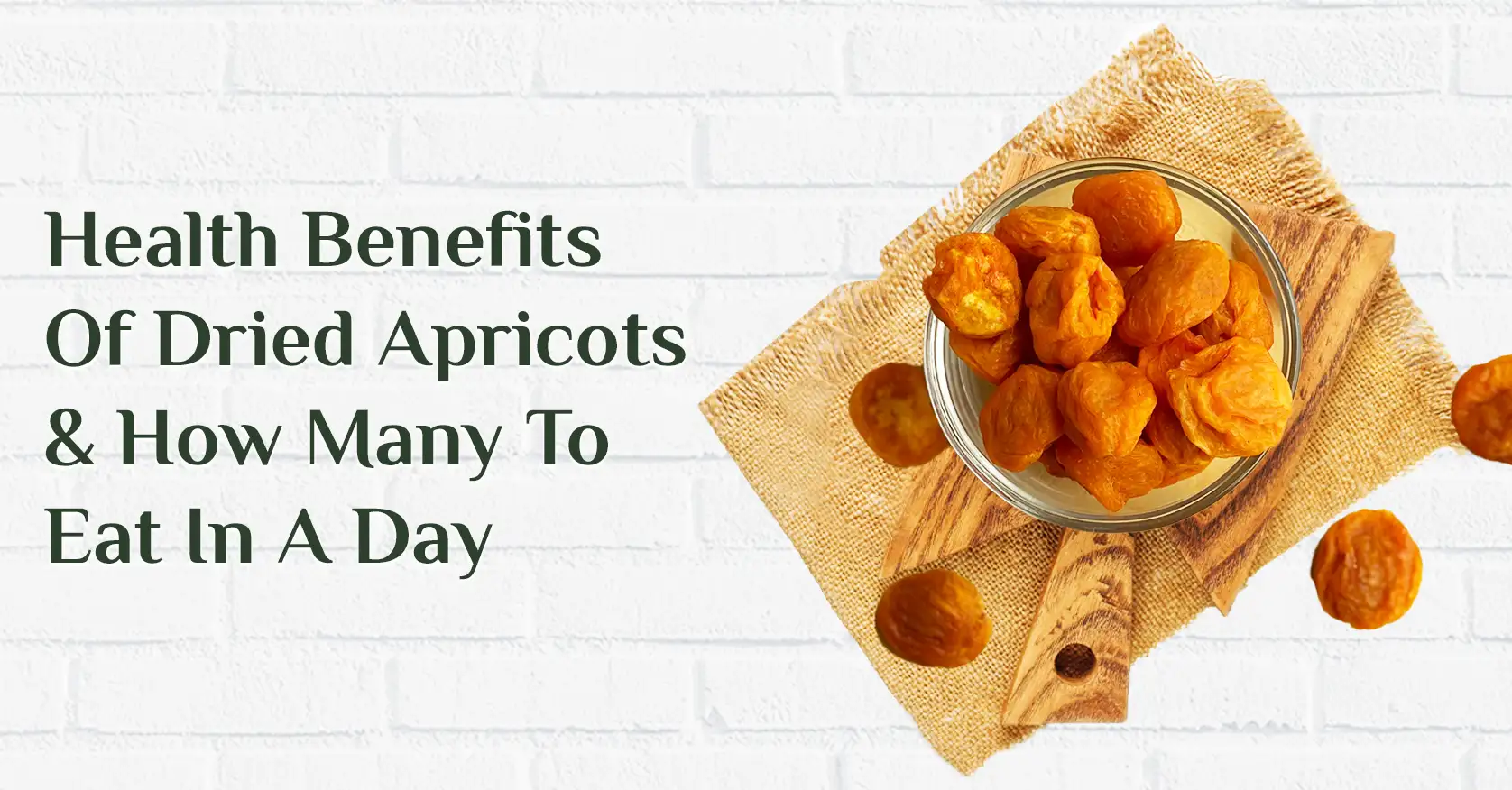Table of Contents
Subscribe to our Newsletter
Health Benefits of Dried Apricots & How Many to Eat in a Day

- By Parth Soni
- Satvic Sense
Health can make or break you, so make sure you’re getting enough fibre in your diet. Fruits and vegetables have been widely touted for their health benefits. Such a diet can help regulate bowel habits and blood sugar levels. But, in today’s fast-paced world, sticking to dietary restrictions can be challenging task.
When you’re on the run, dried fruit can be the most convenient snack. But again, dried version of your favourite fresh fruit, is a healthy option only when consumed in moderation.
Dry fruits are easy to transport and can keep you energised on the go because of the nutritious ingredients and compact size.
When it comes to dried fruits, apricots tend to be a crowd pleaser. Discover the several health benefits of eating dry apricots. The apricot is a powerhouse among these fruits, containing significant amounts of the vitamins A, C, and potassium. When compared to fresh apricots, dried ones are nutritionally equivalent. They are still an excellent source of vitamins A and C as well as iron, phosphorus, potassium, and calcium.
To start, let’s define dried fruits.
Fruits that have been dried in the sun or in specialised dryers lose much of their moisture content and are referred to as dried fruits. Natural evaporation or artificial dehydration ensures that most of the moisture is gone. This causes the fruit to reduce in size and increase in nutritional density.
Dried fruits come in many forms, with raisins, dates, prunes, figs, and apricots being some of the most prevalent. Nuts and dry fruits have far more nutritional value than fresh fruit. That’s why they’re worth the money.
Almonds, pistachios, dates, cashews, walnuts, and hazelnuts are all examples of nuts that occur naturally. Raisins and Anjeer, sometimes known as figs, are both types of dried fruit.
Health Benefits of Dried Apricots
Water, minerals, and vitamin content will naturally vary from fruit to fruit. The fruit’s minerals and calories are concentrated throughout the drying process. The nutritional value of dried apricots, for example, includes the following:
- Fresh apricots, when cut in half, are roughly 74 calories and 86% water by volume.
- A cup of dried apricots, on the other hand, has only about 212 calories and a lot less water.
- The dietary fibre content of fresh apricots is around 3.1 grammes, while that of dried apricots is around 9 grammes.
Blood clotting
- Dried apricots are a good source of vitamin K, which aids in blood clotting. Excessive bleeding can be controlled by taking this vitamin.
- Dietary supplements are easily accessible in the market. However, vitamin K supplements are still not recommended by nutrition experts. You can keep your supply of this vitamin high by eating dried apricots every day.
Immunity Enhancers
Vitamins A, D, B6, K1, and E, along with other minerals and vitamins, can be found in abundance in dry fruits. These vitamins and minerals are crucial for maintaining a strong immune system. Dry fruits rich in polyphenols have been shown to have anti-inflammatory effects, which can help boost the immune system. Several dry fruits also include antioxidants characteristics. Reducing oxidative stress and getting rid of free radicals are two more health benefits of apricot.
It Helps You Shed Pounds
Dry fruits are high in carbohydrates and fibre, making them a great snack option. Eating them in moderation can help you lose weight due to the fibre they contain. In a cross-sectional analysis, researchers found that those whose diets were poor in fresh, whole fruits and dried fruits had a higher body mass index. Both fresh and dried fruits have been shown to have beneficial effects on appetite control, fullness, and calorie consumption, but dried apricots have not been studied in relation to weight loss. It is important to remember the importance of moderation and talking to a professional nutritionist when eating dried apricots.
Controls high blood pressure
Dried apricots provide three times as much potassium as bananas do. It has an extremely low quantity of salt, which is great for anyone trying to keep their blood pressure in check. It also helps keep heart disease at bay.
Enhanced eye health
Vitamin E protects the eyes from free radical damage, while vitamin A aids with night vision. Dried apricots provide about 1280 international units (IU) and 1.53 milligrams (mg) of vitamin A per 100 grams. The health of your eyes depends on these minerals.
Useful During Pregnancy
The iron in dried apricots has been linked to better blood health. During pregnancy, a woman’s blood volume increases by as much as 50%, necessitating an increase in iron intake. Metabolic alterations can occur during pregnancy and breastfeeding, leading to constipation. Consistent consumption of water and fibre-rich meals, such as dried apricots, may alleviate gastrointestinal discomfort.
Diabetes risk reduced
Flavonoids have been shown to ameliorate diabetes aetiology and its associated problems by influencing glucose metabolism, hepatic enzyme activities, and a lipid profile. A 2017 study showed that eating dried fruits is associated with a lower risk of developing type 2 diabetes. The beneficial effect on diabetes is due to their combination of macronutrients, micronutrients, and other bioactive substances. Fibre, fat, minerals, and other beneficial compounds can all be found in dry fruits, which contribute to the regulation of gene processes. The insulin-regulating effects of the dietary fibre in several dry fruits, such as cashews, have been the subject of some research.
What’s the Daily Intake Limit for Dried Apricots?
The U.S. Department of Agriculture recommends consuming 1 to 2 cups of dry fruit every day, with dried apricots being half a cup. The best time to eat dried apricots is early in the morning on an empty stomach. A clinical nutritionist, suggests soaking dried apricots overnight or for at least 4-5 hours in warm water to remove sulphites used to preserve them. There is less information on the side effects of dried apricots, but they are naturally healthy in normal food amounts. However, it is important to be careful when purchasing dried apricots from the market, as improperly stored dried fruits may be contaminated by toxins and other fungi, and certain dried fruits may trigger asthma in susceptible individuals.
Dried apricots are high in calories despite their abundance of vitamins, minerals, and other beneficial substances. Therefore, it is recommended that you begin with half a cup to a cup of dried apricots in the beginning.
Our selection of dried apricots, all of which are sourced with care from Kashmir, gives you a wide variety of options for incorporating the wonderful health benefits of apricots into your regular meals. So what are you waiting for? Buy dried Kashmiri apricots right away.

